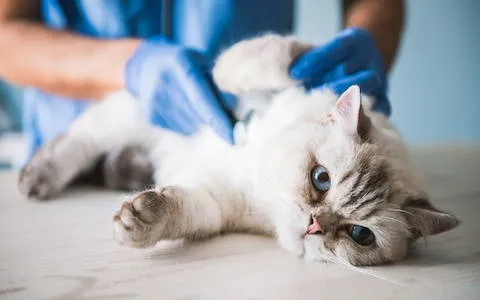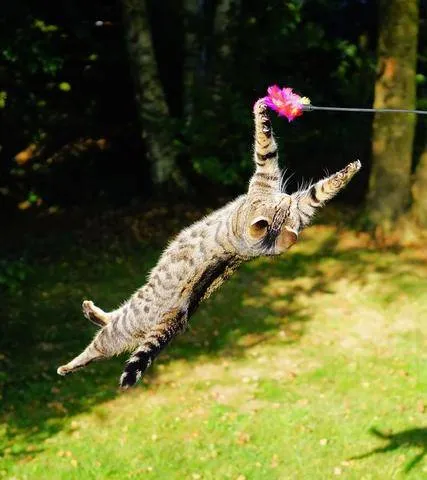A cat’s digestive health profoundly impacts nearly every aspect of their overall well-being and happiness, from efficient digestion to their mental state. Within your cat’s digestive tract resides a unique ecosystem, home to hundreds of distinct types of single-celled microorganisms, primarily bacteria, collectively known as the gut microbiome. These gut bacteria play a critical role in digestion and the extraction of essential nutrients from the food your cat consumes. Maintaining robust Cat Gut Health is paramount for a thriving feline companion.
Unfortunately, there’s been a noticeable increase in inflammatory diseases in both pets and humans. Beneficial gut bacteria can be severely compromised by exposure to broad-spectrum antibiotics, antimicrobials, various food additives, and certain medications. When the delicate balance of gut bacteria is disturbed, chronic digestive disorders, such as feline inflammatory bowel disease (IBD) [cite: kittybiome.com/expert-advice/my-cat-was-diagnosed-with-inflammatory-bowel-disease/], can emerge. In this environment, it’s more crucial than ever for pet owners to actively support and improve their cat’s gut health. But what specific steps can we take to achieve this? Below, we’ve compiled nine effective strategies to enhance your cat’s digestive well-being through thoughtful nutritional adjustments, targeted health interventions, and enriching environmental modifications. Always consult with your veterinarian before implementing any significant changes to your cat’s diet or care regimen, as these suggestions are not a substitute for professional veterinary advice.
Nutritional Changes for Enhanced Cat Gut Health
Optimizing your cat’s diet is a foundational step in supporting their gut microbiome and overall feline digestive health. The specific nutrients your cat consumes directly influence the types of bacteria that flourish within their gut, making dietary choices a powerful tool for maintaining balance.
#1 Diet
The composition of your cat’s gut bacteria is heavily influenced by their diet because these microbes are responsible for breaking down food. Cats that consume high-carbohydrate cat foods, often containing ingredients like rice or potatoes, tend to develop gut microbiomes [cite: kittybiome.com/cat-gut-microbiome/] with an excess of carb-loving bacteria. Some research indicates that an overabundance of these specific bacteria can be linked to heightened inflammation, potentially leading to various feline health issues. Given that cats are obligate carnivores, their ideal diet should be rich in protein and low in carbohydrates. Many cat owners opt for diets emphasizing raw meat, maximizing protein content while significantly reducing carbohydrates to promote optimal cat gut health.
#2 Prebiotics
Prebiotics are specialized forms of dietary fiber designed to stimulate the growth and activity of beneficial gut bacteria. While many natural foods contain these compounds, some pet parents choose to supplement their cats’ diets with additional prebiotics. Studies in mice have shown that prebiotic-induced microbiome shifts can effectively counteract inflammation [cite: www.nature.com/articles/ismej201445] caused by a high-fat diet. When introducing prebiotics to your cat’s regimen, it’s advisable to start with small doses and closely monitor their response to ensure they tolerate the supplement well and to observe positive changes in their cat gut health.
#3 Probiotics
Many pet parents frequently administer cat probiotics [cite: kittybiome.com/expert-advice/how-to-pick-a-probiotic-for-your-pet/] containing high quantities of live bacteria. However, it’s important to note that the bacterial strains found in these commercial probiotics are often not originally isolated from cats (they typically contain strains from soil or other animals). Consequently, these introduced bacteria are often outcompeted by the indigenous bacteria already residing in your cat’s gut. This means that these probiotic microbes generally do not establish permanent residency [cite: kittybiome.com/expert-advice/probiotics-for-your-pet-do-they-work/] within your cat’s microbiome. For this reason, many users find that consistent, daily supplementation yields the most significant benefits. Considering that cats are carnivores with highly acidic stomachs—far more acidic than humans or dogs—it is crucial to select a probiotic enclosed in an enteric-coated capsule. This protective coating ensures the bacteria survive the harsh stomach acid and successfully reach the intestines, where they can contribute to cat gut health.
Health Interventions to Bolster Cat Gut Health
Beyond dietary adjustments, several health interventions can directly address existing imbalances and significantly contribute to improving your cat’s gut health, offering more targeted support for digestive issues.
#4 Fecal Microbiota Transplant (FMT)
A fecal microbiota transplant (FMT) [cite: kittybiome.com/expert-advice/healing-your-cat-with-a-fecal-transplant/] involves transferring beneficial gut bacteria from a healthy donor cat to a recipient cat with an unhealthy microbiome. Historically, FMTs administered via enema were performed in veterinary hospitals under sedation, often using material that wasn’t thoroughly screened for pathogens. This procedure could be stressful for the cat and costly for the owner. Modern advancements, such as oral FMT capsules, offer a more convenient and less invasive alternative. These specialized Gut Restore Supplements [cite: shop.animalbiome.com/products/kittybiome-gut-restore-supplement] are formulated for cats experiencing health issues linked to their gut microbiome, including various digestive disorders, allergies, and skin problems in cats. These fecal transplant capsules [cite: kittybiome.com/cat-fecal-microbiota-transplant/] are considered more potent than conventional cat probiotics or prescription diets because they contain a diverse array of thousands of beneficial bacteria typically found in a healthy feline gut, making them a powerful tool for restoring cat gut health.
 Fecal transplants for cats are designed to address digestive health issues, cat allergies, and cat skin problems, by restoring a healthy cat gut microbiome.
Fecal transplants for cats are designed to address digestive health issues, cat allergies, and cat skin problems, by restoring a healthy cat gut microbiome.
#5 Antibiotics
While not all bacteria in your cat’s gut are beneficial, and sometimes an infection or overgrowth of harmful bacteria necessitates intervention, antibiotics are a double-edged sword for cat gut health. Antibiotics work by inhibiting essential life functions of bacteria, effectively killing their targets. However, most of these medications are “broad-spectrum,” meaning they indiscriminately eliminate not only the harmful bacteria but also crucial beneficial bacteria necessary for healthy gut function [cite: kittybiome.com/expert-advice/how-to-support-your-cat-during-after-antibiotics/]. This can lead to significant and often long-term changes in your cat’s gut health. Despite this, antibiotics remain an indispensable veterinary tool and can be absolutely vital for your feline’s recovery. They are only available with a veterinarian’s prescription and must be administered precisely as instructed. If your cat requires antibiotics, it’s wise to consider supporting their microbiome during and after treatment. Supplements like Gut Maintenance Plus [cite: shop.animalbiome.com/products/kittybiome-gmp] contain yeast-based probiotics such as S. boulardii, which are resilient to antibiotics and can help mitigate diarrhea flare-ups during treatment. Following antibiotic therapy, a microbiome test [cite: shop.animalbiome.com/products/kittybiome-gut-health-test] can assess the status of your cat’s gut health, identifying bacterial imbalances and guiding recommendations for diet, lifestyle, or supplements to restore the natural balance and improve overall cat gut health.
#6 Dental Hygiene
Neglecting oral health in cats can have ripple effects throughout their body, including their gut. When dental hygiene is poor, bacteria associated with chronic inflammation become more prevalent in the mouth. While these oral bacteria typically don’t survive in the digestive tract, where they are usually outcompeted by resident bacteria, emerging research suggests a potential link. A recent study in mice [cite: www.science.org/doi/10.1126/science.aan4526] indicated that certain oral bacteria, such as Klebsiella, can migrate to the gut and contribute to intestinal diseases like inflammatory bowel disease (IBD), ulcerative colitis, and Crohn’s disease. If these oral bacteria colonize the gut, they may “help perpetuate gut microbiota dysbiosis (imbalance) and chronic inflammation.” This issue can be exacerbated by antibiotic treatments, as some Klebsiella strains are antibiotic-resistant and can replace beneficial colon-dwelling bacteria after therapy. The most effective way to prevent this problem and support cat gut health is by regularly brushing your cat’s teeth with a cat-specific toothpaste, thereby reducing the abundance of inflammation-associated oral bacteria like Klebsiella.
Environmental Interventions for Optimal Cat Gut Health
Beyond diet and direct health treatments, your cat’s environment and lifestyle play a significant role in shaping their gut microbiome and overall well-being. Simple changes can lead to profound improvements in cat gut health.
#7 Exercise
A considerable portion of cats in the US are overweight or obese [cite: www.vet.cornell.edu/departments-centers-and-institutes/cornell-feline-health-center/health-information/feline-health-topics/obesity]. Feline obesity has profound negative impacts on the gut microbiome and, consequently, their overall health. Active cats tend to have a greater abundance of Faecalibacterium in their guts compared to less active felines. This increased presence of Faecalibacterium is associated with a decreased risk of developing chronic digestive diseases and even certain types of cancer, underscoring the importance of exercise for cat gut health. For indoor cats, encouraging physical activity can be challenging. Creative approaches include hiding food pieces around the house to stimulate their natural “hunting” instincts [cite: www.youtube.com/watch?v=rTY8MAjd3_k], using a laser pointer for chasing games, or even teaching your cat to swim [cite: www.youtube.com/watch?v=auXSN_mZNKk].
 An active cat playing with a toy mouse, demonstrating how exercise helps improve a cat's gut health and overall fitness.
An active cat playing with a toy mouse, demonstrating how exercise helps improve a cat's gut health and overall fitness.
#8 Mental Stimulation
The intricate connection between the gut and the brain means that gut bacteria can influence your cat’s mood, and conversely, psychological states like stress can impact your cat’s microbiome. Research in humans [cite: www.sciencedaily.com/releases/2011/03/110321094231.htm] has shown that stress can shift the microbiome towards an unhealthy state. For cats already dealing with digestive issues, stress can significantly exacerbate symptoms. Providing adequate mental stimulation [cite: www.catster.com/lifestyle/how-to-keep-your-cat-mentally-stimulated-and-physically-trim] is an excellent way to redirect your cat’s attention from potential stressors and promote a healthier mental state, which in turn supports cat gut health. This can be achieved by introducing new toys, utilizing food puzzles for mealtime, or teaching them new tricks in exchange for treats.
#9 Exposure to the Outdoors
Nature is a rich source of diverse bacteria that can be beneficial for your cat’s microbiome. These microbes are present in soil, on plants, and even in the air. If allowing your cat unsupervised outdoor access isn’t safe in your area, consider alternatives such as a cat-specific harness for supervised walks or constructing a “catio”—a safe outdoor enclosure attached to your home. These methods allow your cat to experience the varied microbial environment of the outdoors, which can contribute positively to their overall cat gut health and biodiversity.
Understanding Your Cat’s Gut Health With Microbiome Testing
Knowing the precise composition of your cat’s microbiome is the most effective way to choose the best and most targeted interventions for their unique needs. Symptoms such as chronic diarrhea, constipation, or issues with the immune system are often directly related to an imbalance within the digestive system. By accurately identifying and addressing imbalances or low bacterial diversity in your cat’s gut, you can significantly improve gastrointestinal symptoms and potentially prevent chronic digestive conditions from developing in the future, thus enhancing long-term cat gut health.
AnimalBiome’s at-home KittyBiome Gut Health Test [cite: shop.animalbiome.com/products/kittybiome-gut-health-test] offers a comprehensive analysis, identifying bacterial imbalances and providing personalized diet, lifestyle, and supplement recommendations based on your cat’s specific microbiome composition. The test kit includes everything needed to collect a small fecal sample from your cat and send it for assessment. Take control of your cat’s digestive future today!
